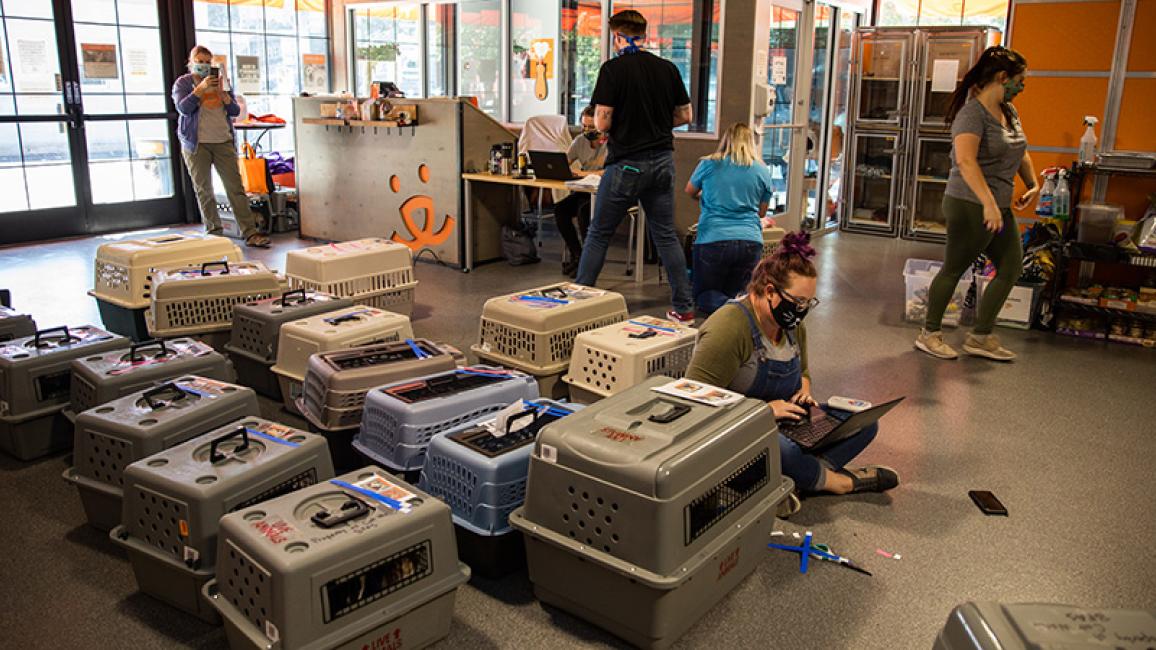Preventing crisis in our nation’s shelters

Sixteen years ago around this time, Hurricane Katrina tore through the Gulf Coast killing several thousand people, flooding New Orleans and splintering buildings across the region. A stunned nation was glued to their TVs watching the immediate aftermath unfold in real time. Within that transfixing coverage were pictures of some of the 88,000 animals who were left behind to fend for themselves. No one really knows how many animals died, but the Louisiana SPCA estimates that 50,000 to 70,000 pets were killed as a result of Katrina.
Animal lovers everywhere were galvanized into action by the images of dogs and cats perched on floating debris, chained to porches in water up to their chests, shivering in contaminated mud and cowering in confusion. Donations of goods, services and funding flowed into local and national animal organizations working on the ground. Thousands of rescued pets were transported from coast to coast to be fostered and ultimately adopted by families across the U.S. and into Canada. The outpouring of compassion for homeless pets at risk of death was unprecedented.
Hurricane Katrina is now a memory, but the people and pets impacted by that devastating hurricane will be in our hearts and memories forever. Today, we have an animal disaster unfolding in our nation’s shelters. In 2020, about 347,000 dogs and cats lost their lives in shelters — and that was a record low! Best Friends and our partners, including shelters in every state, are working to put an end to the killing in shelters by 2025, but compassionate action from the animal-loving public is the only thing that will guarantee success, and we need action now.
Earlier this summer, we celebrated the tremendous lifesaving progress made in 2020. While this progress is still worth celebrating, what’s more important right now is doing everything we can to avoid a reverse in lifesaving trends.
So, what exactly is happening at shelters around the country, and what can we do about it?
Best Friends recently surveyed 187 shelters and partner organizations to identify the most pressing challenges and trends that they are seeing. Of those surveyed, only 30.5% responded that they were operating normally; 87% reported below-normal staff levels. This staffing shortage is having an impact on nearly all aspects of shelter operations, resulting in restricted hours, limited volunteer access, fewer adoption and fostering services, and reduced ability to provide animal care and veterinary services.
We have heard stories for months about the impact of the labor shortage on all aspects of the economy, and animal welfare is not exempt from that. The most cited reason (71%) for the staffing shortage was the inability “to recruit, hire and maintain staffing levels.” On top of that, 75% of staff report that they are more stressed than usual. These shelters must do the same lifesaving work while operating with fewer people and stronger restrictions in many places, and also worrying about the public health aspects of the ever-changing COVID-19 pandemic.
In addition to these challenges, fewer people are adopting and fostering right now. Best Friends conducted a survey of the general population in late July, and 59% of respondents said they are delaying acquiring a pet. The reasons cited included returning to the office, getting a new job, vacation plans and other reasons related to the pandemic or hoping things will return to normal. At the same time, it’s the height of kitten season, when we always see a significant uptick in the number of cats coming into shelters. With fewer pets leaving shelters through foster care and adoption, shelters must make more unthinkable life-and-death decisions every day.
The truth is that we need a public response not far off from the public support we saw after Hurricane Katrina. The difference this time is that many news outlets aren’t following the crisis in America’s shelters.
The good news is that there are ways to help. For those considering adopting and debating whether the time is right, keep in mind that the right pet for your lifestyle is out there. Think about the benefits of coming home to happiness. Pets make our lives better, they can help us relax after a long day, and they provide unconditional love, which is hard to beat. When it comes to making major life decisions, the question will always be whether the time is right, but you can be the lifesaving difference, especially right now.
While so many aspects of the pandemic are beyond anyone’s control, you can undoubtedly make a difference by adopting or fostering a pet from your local shelter or rescue group. Saving a life is incredibly rewarding, and you get to come home to the embodiment of happiness in a grateful cat or dog. If you’re a matchmaker, maybe you can help a friend or family member find a new furry companion and save a pet’s life.
We have made tremendous progress in recent years, and the secret sauce to our success has always been and always will be the kindness and compassion of pet lovers like you.
Together, we will Save Them All.
